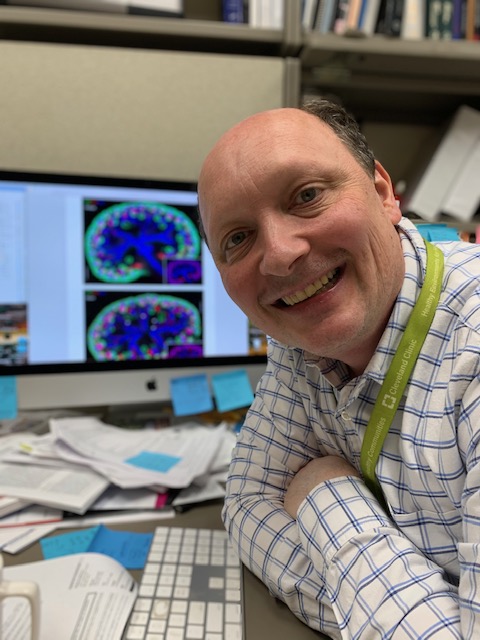Published Feb. 18, 2020
Oliver Wessely, Ph.D. | Cleveland Clinic/Case Western Reserve University

PKD Foundation (PKDF): How did you first get involved in PKD research?
Oliver: By serendipity. I was studying a gene involved in early embryonic development in frogs. When we decided to study its function in mouse, we realized that its loss-of-function developed a PKD phenotype highly resembling the one of PKD1 and PKD2. So, I followed this observation up and have been involved in PKD research ever since.
PKDF: What are you working on currently?
Oliver: We recently discovered that PKD1 has a critical role in modulating G-Protein Coupled Receptors. We are now exploring where this interaction is occurring with a particular focus on the cilia.
PKDF: What would you like the patient community to know about your research?
Oliver: I strongly believe that better understanding of the endogenous role of PKD1 in the kidney (and other parts of the body), is critical in finding biologically relevant pathways that offer novel ways to successfully treat PKD.
PKDF: Do you have a personal connection to PKD?
Oliver: Over the years, I have met several PKD patients and have learned about their experiences living with the disease. This has been very motivational. Hearing stories from PKD patients moved my research from an abstract disease to a much more person-inspired approach.
PKDF: What excites you most about this research?
Oliver: Since joining the community, I have been impressed by the vibrant research going on in the field. There is a constant influx of novel ideas, which makes science exciting. I strongly believe that such a research environment is a prerequisite to understanding a complex disease like PKD.
PKDF: What are some of your personal interests outside of research?
Oliver: Family and travel. I have two young kids and it is important to balance the busy schedule of a scientist with time spent together with my family.
PKDF: Anything else you’d like to share?
Oliver: Science is never a straight path and one should be prepared to follow it where it goes. The surprise twists are what makes most of the fun in science.
Check out Dr. Wessely’s grant and others funded by PKDF here!
PKD Foundation is the largest private funder of PKD research in the U.S. Since 1982, we’ve invested over $50 million in more than 1,300 research, clinical and scientific grants, fellowships and scientific meetings. Each year, the Foundation identifies and supports the work of scientists and researchers from around the world who look for ways to treat and eventually cure PKD.
Our vision is to end PKD. Donations help fund necessary research that leads to more effective treatments and ultimately a cure for PKD.









0 Comments